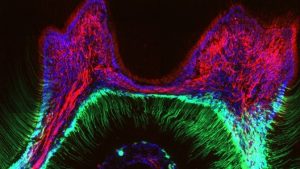
Scientists believe they have worked out why biting down on ice or drinking something really cold causes excruciating pain for some people.
They have located the cells and signals in sensitive teeth that detect big temperature drops and trigger toothache and brain jolt. People with dental decay are prone to it because the pathway is exposed. It provides a target for new treatments, such as toothpastes, dental patches or chewing gum, they say.
The target is called TRPC5, and a team at the Friedrich-Alexander University Erlangen-Nürnberg in Germany traced its location to a specific cell type – the odontoblast – that resides between the soft inner pulp and the hard outer layer of teeth composed of dentine, then enamel.
 Enamel has no feeling, unlike the next layer dentine.
Enamel has no feeling, unlike the next layer dentine.
The dentine connects to the innermost pulp, where nerve cells live.
If the dentine becomes exposed, following tooth decay or gum disease for example, painful stimuli such as temperature or certain liquids will cause pain.
The researchers studied mice and humans to understand how the pain arises, recording what was happening in cells and nerves.
In human teeth with pits and dental caries we found a much upregulated number of TRPC5 channels, and therefore we believe that engineering a TRPC5 blocker that can be locally applied to teeth via strips or chewing gum would probably be a great help in treating tooth pain or dentine hypersensitivity.
One common home remedy – clove oil – contains a chemical called eugenol that blocks this TRPC5 pathway. The scientists are not recommending DIY treatments though. People who are experiencing any worrying toothache should still see a dentist, they stress.
The research is interesting, but we can’t ignore the underlying causes of tooth sensitivity, nor people’s perception of pain. Dentists can treat the cause by removing the tooth decay and advise on toothpaste for sensitive teeth.
Tooth decay happens when the enamel and dentine of a tooth become softened by acid attacks after eating or drinking anything containing sugars. Over time, the acid makes a cavity (hole) in the tooth.
Your risk of tooth decay is increased by how often you have sugary or acidic foods or drinks, so it is best to limit them to mealtimes. If you think you might need a dental check up and you live near Koo Wee Rup, then contact us today.
